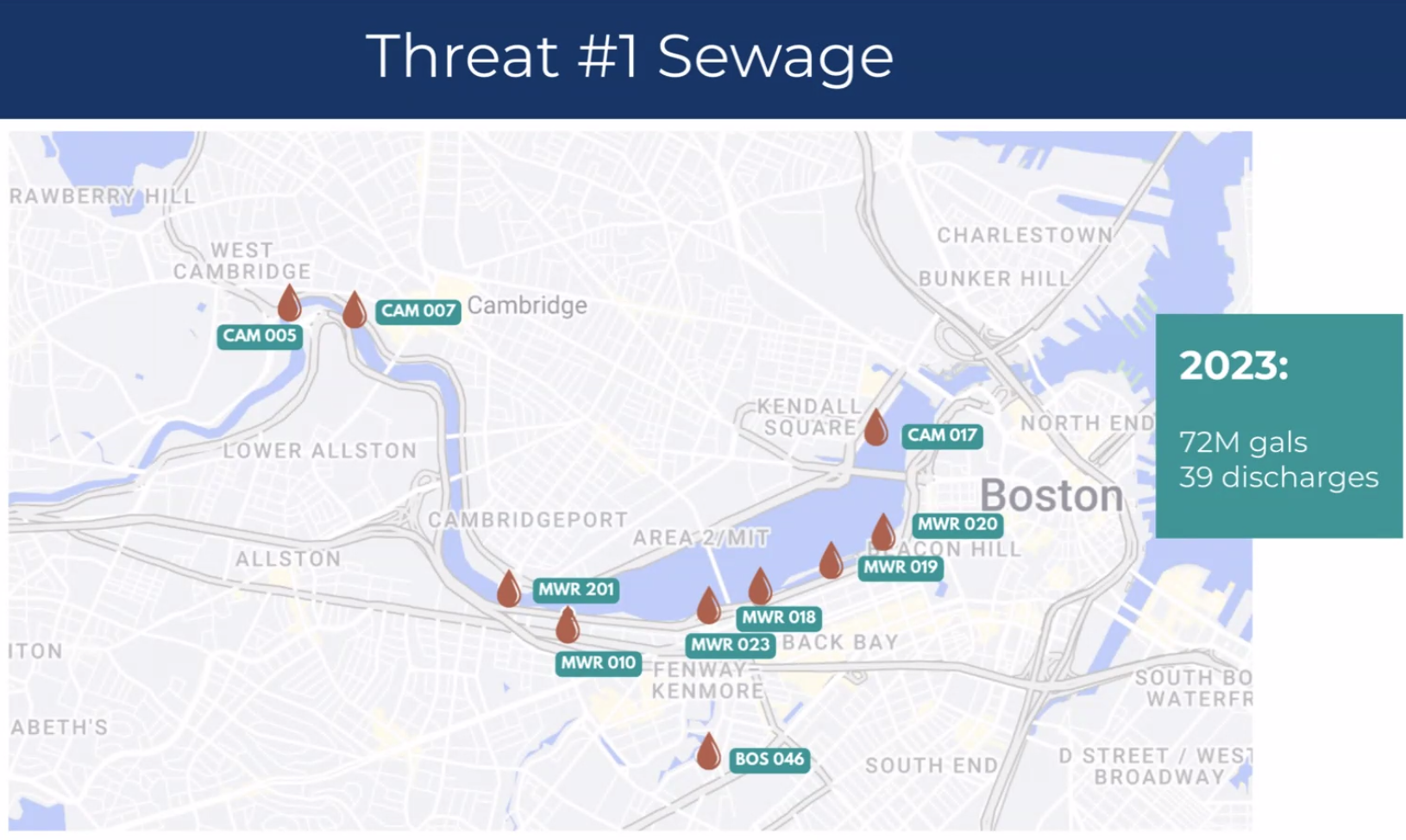Boston Green Action congratulates the Charles River Watershed Association, Executive Director Emily Norton, and the Green Committee of the Back Bay Neighborhood Association for hosting this essential community meeting on Monday evening, April 29th.
In case you missed Emily’s presentation or the conversation that followed, here is the recording.
Prior to the meeting, Emily sent a powerful email to the City Council on the subject of stormwater mitigation. Read an excerpt here:
Dear Chair Lara, Vice Chair Breadon and members of the Committee on Environmental Justice, Resiliency, and Parks,
Thank you for inviting CRWA to testify before the Committee at the October 30 hearing on stormwater. We appreciate your leadership in organizing this hearing which demonstrates your commitment to protecting the residents and properties in Boston from the risks of stormwater flooding, which will only increase over time. We thought it would be helpful to follow-up with a summary of CRWA’s recommendations for you. Please consider us a resource and partner as you work to turn ideas into legislative and/or policy change.
Actions Boston can take right now
- Require flood history disclosure: Massachusetts is one of only 15 states that has no disclosure requirements for potential home buyers. Renters also need to be aware of risks to their properties. The City could also investigate the possibility of requiring notification to tenants when a unit is in a 1% or .2% chance flood zone and force landlords to disclose when the unit has previously been damaged by flooding as New York did in December.
- Provide more funding for stormwater management: The City Council should encourage the executive branch to partner with BWSC to use the new stormwater utility revenues to repair aging infrastructure, and invest in green and gray infrastructure to reduce flood risks, particularly in environmental justice neighborhoods.
- Strengthen and broaden stormwater requirements: Achieving stormwater control on new and redevelopment projects is an important aspect of flood control and reduces pollution to the Charles River. Boston should consider the following steps to strengthen stormwater regulations:
(1) Reducing size thresholds for triggering stormwater permit requirements. For example in Arlington MA, any project >350 SF must meet infiltration and storage standards.
(2) Increased storm-based retention standards In boston new projects must retain 1 – 1.25 inches on site. More ambitious targets can be achieved without economic hardship and will help the city mitigate pollution and flooding. For example storing and infiltrating the 100 year flood is required in Watertown.
(3) Requiring green infrastructure stormwater controls to be integrated into public projects and regularly scheduled roadwork to lead by example (Such policies have been adopted in Philadelphia,Portland, and Arlington.)
(4) Enact additional infiltration and storage requirements in CSO areas. Finance property retrofits and repairs: Boston should provide financial and technical assistance to property owners at risk of flooding.
- Strengthen development and building regulations: Updated flood overlay districts and stormwater regulations, and common-sense building code improvements, like raising utilities by at least six inches, can help limit the disruption and financial impacts caused by stormwater flooding.
- Adopt innovative insurance strategies to assist low-income households: Many insurance programs are not affordable for low-income households and are slow to reimburse costs. Some cities have started providing insurance.
- Continue to investigate the causes and impacts of stormwater flooding: We appreciate the extensive modeling BWSC has and is doing regarding stormwater flooding. MAPC’s analysis points to the need for additional research into groundwater and wetlands dynamics, as well as impacts on Environmental Justice populations. Ongoing study of flooding events, and interviews with affected residents, are needed to improve our capacity to reduce future flooding impacts. Boston is in an excellent position to partner with some of the world’s premiere education and research institutions to further our understanding of these issues.
- Educate Residents: One of the lowest cost and most impactful actions that the city can take in the coming months is to conduct outreach and educate city residents and business owners about flood risks and protection strategies. Doing so can help mitigate future negative economic and climate impacts, lay the groundwork for successful emergency response strategies, and help the city prepare for the future. CRWA is happy to help.
Advocacy: State
Flood Disclosure: Urge state legislators representing Boston to support SB559 – An Act establishing a Massachusetts Flood Risk Protection Program, sponsored by Senator Marc Pacheco. This comprehensive bill simultaneously helps us better understand where flooding is likely to occur and minimizes risk through regular statewide flood assessments and a flood risk protection program that helps move residents and small businesses Out of harm’s way. HB1483 – An Act protecting buyers from unknowingly purchasing property in a flood zone, sponsored by Representative Dylan Fernandes similarly seeks to provide clarity about potential flood risk.
Advocacy: Federal
Enable more widespread access to flood claims data: Federal privacy requirements privilege the privacy rights of current property owners over the needs of municipalities to identify and respond to flood risk, and over the rights of the public to be informed of risk. The city could help advocate for these changes with the state’s federal delegation.
CRWA invites you to take action:
Become a River Steward: Join our dedicated team of volunteers who participate in river cleanups, invasive species removal, and more.
Educate and Advocate: Knowledge is power! Attend some of our amazing upcoming events to learn more about CRWA’s river restoration and stormwater solution efforts.
Make a Gift to Support Our Programs: Consider making a donation to CRWA! Your contribution goes directly to funding critical projects such as stream restoration, water quality research, regional collaboration for climate resilience, and more.


